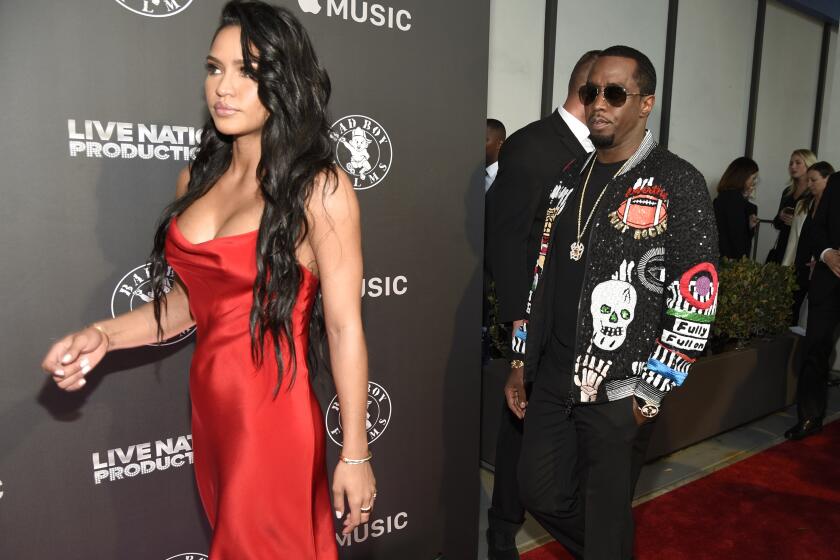Column: This is what it took to expose Sean ‘Diddy’ Combs’ abuse of his girlfriend

- Share via
Thank God for hotel security cameras.
Last week, CNN obtained and broadcast footage of music mogul Sean “Diddy” Combs brutally assaulting a young woman in the hallway of a posh Los Angeles hotel in 2016.
As the video begins, a barefoot young woman is seen fleeing down a corridor toward elevators, stopping to hurriedly put on her shoes. Moments later, Combs emerges from a room wearing only socks and a white towel wrapped around his waist. He chases the woman down, throws her to the ground, kicks her, punches her, drags her by her hoodie and hurls a vase at her.
All while deftly managing to keep his towel in place.
Abuse by partners is all too common, faced by more than 40% of American women. It’s also largely ignored.
The victim is R&B singer Cassie, whose real name is Casandra Ventura. In November, she filed a 35-page federal lawsuit against Combs and his label, Bad Boy Records, alleging that he had physically and sexually abused her for years and frequently forced her into encounters with male prostitutes that he watched and recorded.
The lawsuit, which left me feeling ill, lays out a disturbing narrative of extreme abuse, coerced drug use and sexual perversion over the course of the pair’s 13-year relationship, which began in 2005. When they met, she was a 19-year-old aspiring singer, while he was a 37-year-old rap icon and record label executive. He held her future in his hands, and she describes being trapped in a classic cycle of abuse.
For more than a decade after he signed Ventura to his label, the suit alleges, Combs orchestrated most aspects of her life, regularly hiding her away in hotels — she alleges one such three-week stay in Hawaii — so the black eyes and split lips he inflicted would heal.
At MAGA rallies across the country, Trumpers joyfully proclaim that ‘real men wear diapers.’
Naturally, Combs’ attorney Ben Brafman feigned outrage at the idea that his client was an abuser:
“Mr. Combs vehemently denies these offensive and outrageous allegations,” he told the New York Times. “For the past six months, Mr. Combs has been subjected to Ms. Ventura’s persistent demand of $30 million, under the threat of writing a damaging book about their relationship, which was unequivocally rejected as blatant blackmail.”
Au contraire, retorted Ventura’s attorney Douglas Wigdor: “Mr. Combs offered Ms. Ventura eight figures to silence her and prevent the filing of this lawsuit. She rejected his efforts.”
It took tremendous courage for Ventura to file her lawsuit, which was made possible by New York’s Adult Survivors’ Act. The law gave victims a one-year window to file lawsuits for sexual misconduct alleged to have happened before 2019 for which the statute of limitations had expired. About 3,000 lawsuits were filed before the window closed in November, including, most famously, by E. Jean Carroll, who claimed that Donald Trump had raped her in a department store dressing room in 1996. A jury found Trump liable for defamation and sexual assault, which the presiding judge said was rape by another name.
Strangely enough given Combs’ professions of innocence and victimhood, Ventura’s lawsuit was settled confidentially less than two days after it was filed. At the time, his lawyer emphasized that the settlement in no way implied that Combs was guilty.
Except, come on now. The explosive video perfectly matches many of the allegations made in Ventura’s lawsuit; she doesn’t appear to have been making it up.
The lawsuit alleges that people in Combs’ orbit — his attorney, the president of his record label — pressured her to return to him when she tried to escape. “Each time Ms. Ventura tried to run away,” the lawsuit alleges, “Mr. Combs and his powerful network would force her back to him.”
On Sunday, all too predictably, a teary Combs posted a video on Instagram.
“I was f—ed up,” he says. “I hit rock bottom. I got into going to therapy, going to rehab. I had to ask God for his mercy and grace. I’m so sorry.”
Me, me, me, me. Not a word about the hell he put Ventura through nor even a mention of her name. And anyway, when, exactly, did he hit rock bottom and have his epiphany?
After all, Ventura alleges that in September 2018, more than two years after the hotel hallway incident, he raped her at her home after they met for dinner in Malibu to discuss the end of their relationship.
Within months of Ventura’s lawsuit, four other lawsuits were filed accusing him of sexual assault and other offenses, including one by a woman who was in college when she alleges that Combs drugged and assaulted her, and another by a woman who was a high school junior when she alleges she was sex trafficked and gang raped by Combs and the longtime president of his record label.
It’s unfortunate that Combs cannot be prosecuted for what he did to Ventura in that hallway. The Los Angeles County district attorney’s office said it is powerless to act because the statute of limitations has expired.
But Combs’ troubles may be just beginning. In March, his homes in Miami and Los Angeles were raided by agents of the Department of Homeland Security, who seized computers, hard drives and guns, according to news reports, which said the raids were part of a sexual assault and sex trafficking investigation of Combs, a father of seven. He has not been charged with a crime.
Someone leaked photos of the aftermath of the Holmby Hills raid to TMZ. The rooms looked as if a tornado had swept through — papers, clothing, children’s shoes and stuffed animals strewn all over. News video showed two of Combs’ adult children in handcuffs outside.
It was sad, yes, but an apt visual metaphor for the mess Combs has made.
More to Read
A cure for the common opinion
Get thought-provoking perspectives with our weekly newsletter.
You may occasionally receive promotional content from the Los Angeles Times.












